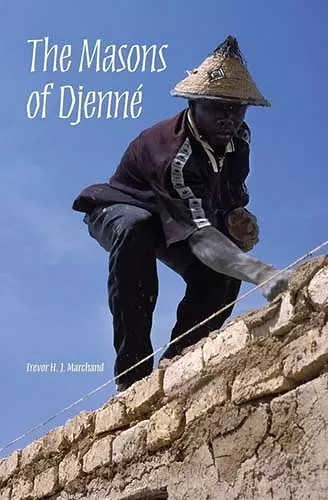The Masons of Djenné
Format:Paperback
Publisher:Indiana University Press
Published:8th Jun '09
Currently unavailable, and unfortunately no date known when it will be back

Artful building practices in one of Africa's most beautiful places
Renowned for its mud-brick architecture, monumental mosque, and merchant-traders' houses, Djenne remains one of Africa's most distinctive cities. This title describes the raising of a mud-brick house and explores the technical, social, and magical processes involved in making buildings and renewing the urban environment of Djenne.
The town of Djenné on the Bani River in Mali has been a thriving settlement for more than two millennia. Renowned for its mud-brick architecture, monumental mosque, and merchant-traders' houses, Djenné remains one of Africa's most distinctive cities. The Masons of Djenné follows Trevor Marchand after he signs on as a builder's apprentice. Marchand takes readers on his journey from raw laborer to skilled craftsman. He explores the professional associations of masons, their social networks, training regimes, and changing fortunes. With his fellow builders, he produces mud bricks and plasters, constructs walls and ceilings, and sculpts rooftop crenellations using specialized tools. Marchand describes the raising of a mud-brick house and explores the technical, social, and magical processes involved in making buildings and renewing the unique urban environment of Djenné.
Talk about hands-on ethnography! To learn construction processes, Marchand (Univ. of London) apprenticed himself to masons working on buildings in Djenné, the UNESCO World Heritage Site along the Niger River in Mali. The Great Mosque of Djenné may be the world's largest mud structure and is among the world's greatest architectural accomplishments. Djenné has been a crossroads for millennia and remains so today, as sleek Italianate balustrades and satellite dishes vie for space with sensuous, seemingly organic, earthen dwellings. Wishing to understand builders as social subjects rather than buildings as cultural objects, Marchand exchanged his own work for the teaching he received, as accommodated by local paradigms of practice-based technology transfer. Through endless hours of tedious toil making mud bricks, toting loads, and assiduously following the instructions of masons higher in the hierarchy, Marchand acquired practical skills that transcend media and method to include oaths, magic, and the fervent prayers of his Muslim colleagues. Personalities loom large in such hard work, as do stunning expertise and the masons' passion for their craft. Like Marchand, readers share this passion, inspired by magnificent photos of men doing the work they love. Summing Up: Highly recommended. All levels/libraries. -- ChoiceA. F. Roberts, University of California, Los Angeles, April 2010
"The author provides a fascinating close-up view of indvidual decision-making processes, as well as a step-by-step description of the various building stages." —Western Folklore, Vol. 70.1, 2011
"Offers a compelling narrative which leads the reader—following the author's experiences—through all stages of construction, and it provides rich and comprehensive portraits of the masons who execute the building process and who are the producers and keepers of Djenné's unique architectural style." —Geert Mommersteeg, University of Utrecht
"Because of its breadth, this book is a valuable resource to architects, anthropologists, conservationists, development experts, and cultural tourists interested in Mali’s architecture and society." —Kathleen Louw, University of California Los Angeles, African Studies Quarterly, Vol. 11.2-3 Spring 2010
"It is a tribute to his skills as an author that the text is not only informative in a scholarly sense but also immensely enjoyable to read.... With this book Marchand has produced a valuable contribution to anthropology and architectural history. The material is thought provoking, accessible, and a joy to read." —Buildings & Landscapes
"... an important contribution to the increasing interest in the study of earthen architecture and the people who inhabit them... The complex and vast number of topics [the author] attempts to distill... are worthy of a dissertation in and of themselves, but [the author] synthesizes them lucidly." —Museum Anthropology Review, Spring-Fall 2011
"An elegantly written and important anthropological study of indigenous knowledge, building practices, and social relationships among contemporary Djenné masons in Mali." —Mary Jo Arnoldi, Smithsonian Institution
"Here is a book that puts the work back into fieldwork with the dirt left under the fingernails. to learn about construction processes, Trevor Marchand apprenticed himself to the masons in Djenné exchanging his labor for learning.... Over and above the book's considerable substantive and theoretical strengths, the unusually accessible exposition of this intercultural dynamic will make it well worth teaching." —Allen F. Roberts, UCLA, AFRICAN STUDIES REVIEW, Vol.53.1 April 2010
"One reads the The Masons of Djenné... as instantiating the qualitities of careful but sure-footed construction and artistry that its author seeks to describe in this vivid portrayal of a community of Mailian masons." —Africa
ISBN: 9780253220721
Dimensions: unknown
Weight: 640g
376 pages